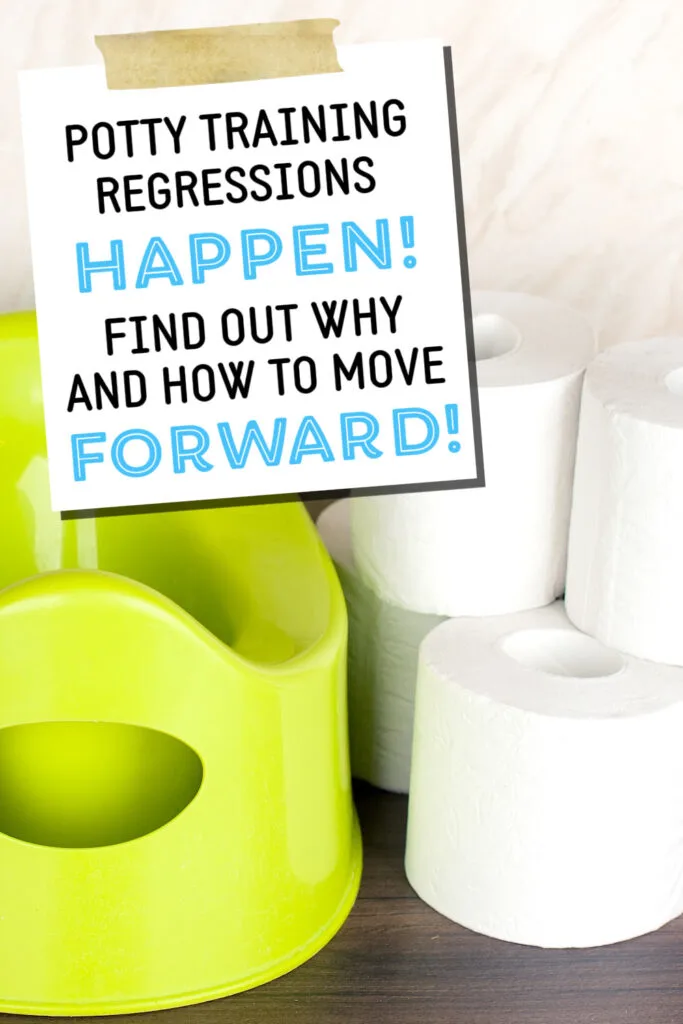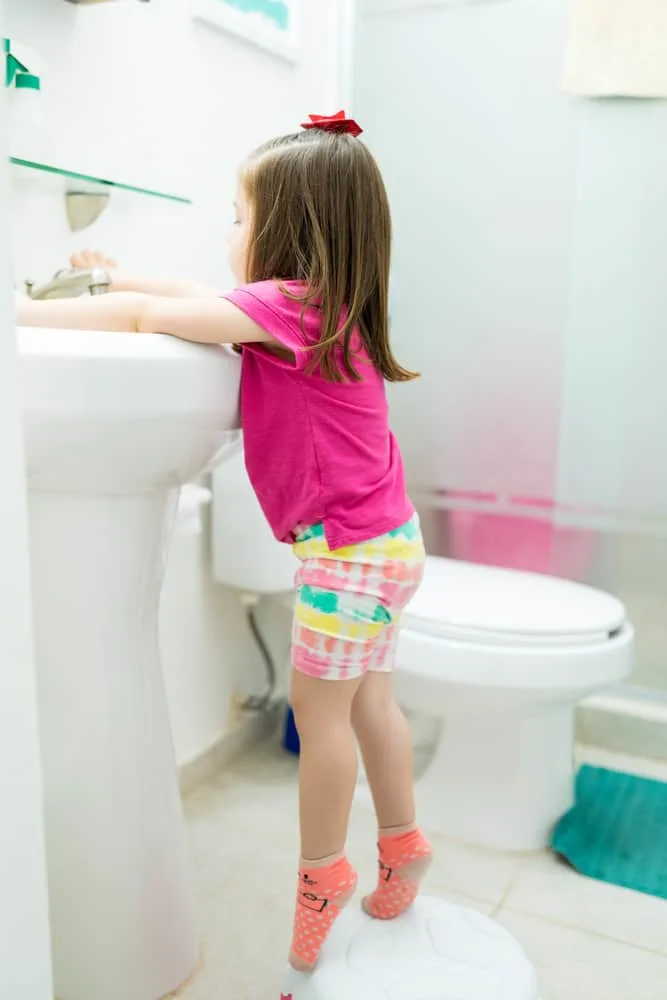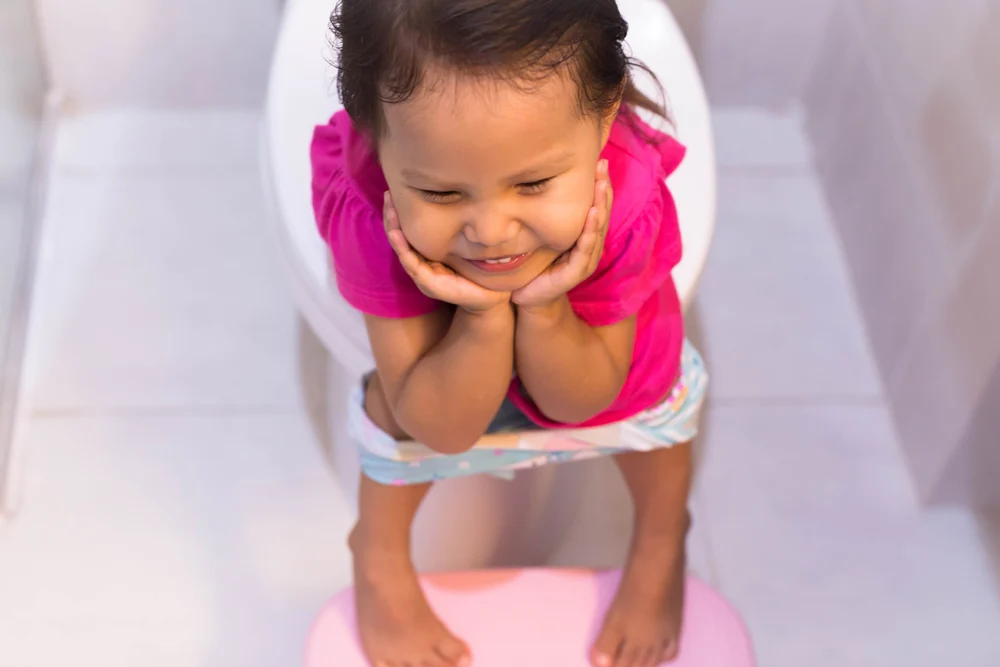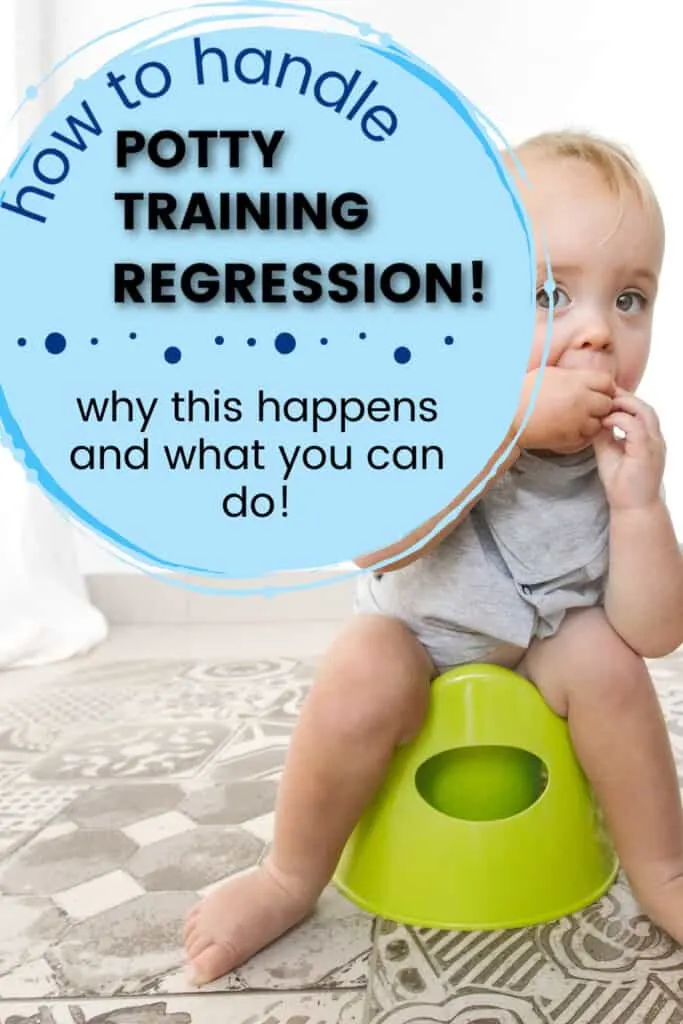Potty Training Regression Happens
Potty training is a significant milestone in a child’s development, but it’s not always a linear process.
Often, parents might face a phenomenon called ‘potty-training regression,’ a stage where young children who’ve been successfully using the toilet for a period, suddenly revert to having accidents.
Take a deep breath, because this is quite normal and there are common reasons behind it.
Notably, changes in the child’s environment, stress, or simply the child asserting their independence can precipitate this regression.
By understanding the causes, you can determine the best way to address toilet training regression in your young ones and re-establish consistency.
This blog aims to provide you with a comprehensive understanding of this issue, so strap in and let’s dive deeper into the world of potty training regression.

(This post may contain affiliate links. To read our full disclosure policy click here.)
Why Potty Regression Happens
Potty training regression typically occurs when a child who has been successfully using the toilet for some time suddenly begins to have accidents.
This can be a frustrating experience for both the child and the parents.
Each of these potential causes warrants its examination and understanding which we will explore in the upcoming sections.

Rule Out Medical Concerns
First and foremost, when dealing with potty training regression, it’s crucial to rule out any underlying medical problems.
Conditions such as constipation or urinary tract infections (UTIs) can cause children to revert to having accidents.
For instance, constipation can lead to painful bowel movements, making a child reluctant to use the toilet.
Similarly, UTIs can create a sense of urgency that a young child might not yet be equipped to handle, leading to accidents.
Therefore, if your child begins to show signs of regression, it’s advisable to consult medical professionals, such as your child’s pediatrician.
They can conduct thorough checks to rule out these health issues or provide appropriate treatment if any medical problems are identified.
By taking this important first step, you can ensure that your response to your child’s potty training regression is informed and effective, addressing the root cause rather than just the symptoms.
Are There Any Big Changes in Your Toddler’s Life
Significant life events or changes can also be a key factor in potty training regression.
When a child’s life undergoes a sudden change, it can often manifest as an increase in potty accidents.
For instance, the birth of a new sibling can have a profound impact on a child’s routine and sense of security.
Suddenly, the child isn’t the center of attention anymore, and this can cause feelings of insecurity, leading to regression in their potty training progress.
Similarly, starting at a new school or daycare can also bring about a bout of regression.
These changes involve new routines, new people, and a new environment, all of which can be overwhelming for a little one.
This can often result in enhanced anxiety levels leading to lapses in toilet training.
Moving to a new house or home can also have the same effect.
The transition from a familiar environment to a new one can be a stressful experience for a child.
This stress can then manifest as an increase in potty accidents as the child tries to cope with the new situation.
Therefore, it’s crucial to understand that these big changes in a child’s life can directly impact their progress in potty training and to respond with patience and understanding.
The Impact of Reward Systems on Potty Training
Sometimes, parents might choose to employ a sticker chart or reward system to motivate their child during potty training.
While initially, this may seem to aid the process, it can inadvertently contribute to a child’s potty training regression once the system is discontinued.
I had used rewards with my first child and saw a regression shortly after stopping them.
Why does this happen?
When a potty-trained child starts associating the act of using the toilet with getting a reward, they may lose interest in the task once the rewards stop.
The child was focusing more on the reward rather than the intrinsic motivation of acquiring a new skill.
This can lead to regression and make potty training a struggle.
Instead of depending on a sticker chart or reward system, it’s more beneficial to follow your child’s lead.
Look out for readiness signs that indicate they are prepared to learn this new skill.
Ensuring there is enough time and patience dedicated to this process can make a significant difference.
Promote potty learning through low-pressure ways.
Remember, every child is unique and their readiness to learn or adapt to new skills can vary.
Ensuring that the process is patient, understanding, and supportive can help mitigate the chances of potty training regression and lead to successful, long-term results.

Time for a Potty Break? Reassessing the Power Struggle
When potty training becomes a power struggle, it might be a good idea to reassess the situation.
If you find that your attempts to manage your child’s regression are met with resistance or increased accidents, it may be a sign that your child is not ready to give up the control associated with their bodily functions.
This struggle is not a reflection of failure; in fact, it’s quite common for first attempts at potty training not to work out.
It’s important to remember that each child’s progress is unique, and there’s no set timeline that applies to everyone.
Reverting back to the use of diapers, although seemingly a step back, could be the best thing to do in such a scenario.
This can alleviate the pressure your child might be feeling and provide them with the space to navigate their own readiness.
In some cases, this break can result in a more successful resumption of potty training in the future. It’s all about patience, understanding, and allowing your child to lead the way in their own time.
Be Patient!
In conclusion, toddler potty training regression is a common occurrence and not a big deal.
It’s crucial to remember that this is often just a phase in your child’s developmental journey.
An array of factors can likely lead to such regression, including potential underlying medical conditions, significant changes in your child’s life, discontinuation of reward systems, or power struggles.
Therefore, before jumping to conclusions, always consult with your child’s healthcare provider to rule out any medical problems.
Understanding the number of factors contributing to this regression can guide you in addressing the root cause effectively, rather than focusing solely on the symptoms.
Remember, patience, understanding, and following your child’s lead are key to navigating this phase successfully.

Grab your FREE Milestone Guide HERE.
Frequently Asked Questions
Yes, it is entirely normal for a child to experience potty training regression. It’s a common occurrence that many parents face during their child’s developmental journey.
It’s always a good idea to consult with your child’s healthcare provider if you notice any sudden changes or ongoing issues with your child’s toilet habits.
They can help rule out any medical conditions that may be contributing to the regression.
The duration of potty training regression varies from child to child and depends on several factors. It’s essential to remain patient and understanding during this phase, as it may take some time for your child to get back on track.
In some cases, regression may only last a few days or weeks, while others may take longer. Remember to focus on addressing the root cause rather than worrying about a timeline.
While it’s not always possible to prevent potty training regression, there are steps you can take to minimize its occurrence.
Ensuring that your child is ready and that there are no underlying medical issues can help set the stage for success.
Also, avoiding pressure or power struggles during potty training can contribute to a smoother experience.
Not every child will go through potty training regression, but it’s a common occurrence among many toddlers.
It’s essential to remember that every child’s progress is unique, and there’s no set timeline for potty training success.
Be patient and understanding with your child during this phase; they will eventually get the hang of it. Overall, potty training regression is a normal part of a child’s toilet learning journey, and with patience and understanding, parents can navigate this phase successfully
Related Posts You Will Enjoy
End Bedtime Battles: Printable Bedtime Routine Chart for Toddlers
Fun Bug Activities for Toddlers
Why does my toddler throw everything?
How to Handle Toddler Screaming
Easy and Fun Early Literacy Ideas for Toddlers


Kayla O’Neill has a master’s degree in education as well as a bachelor’s degree in special education with an emphasis in early childhood education. She has been working as a developmental therapist with babies and toddlers in early intervention since 2012. She is also a mom with two young children.